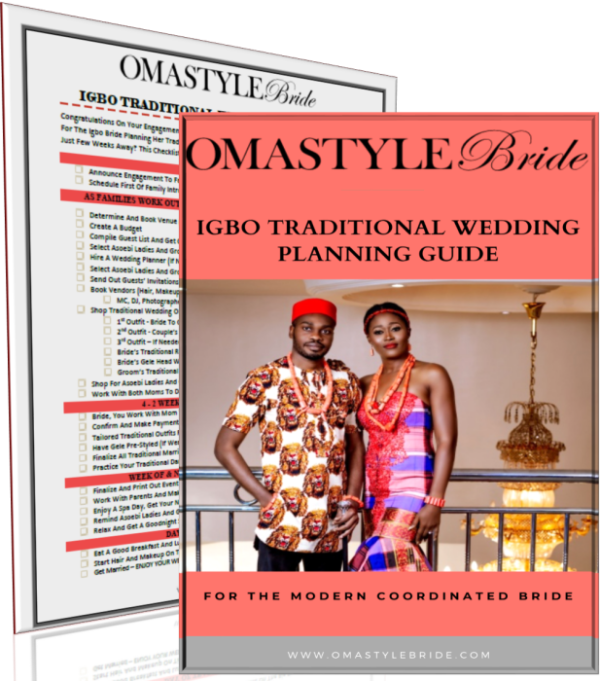Seven Steps of Igbo Traditional Wedding
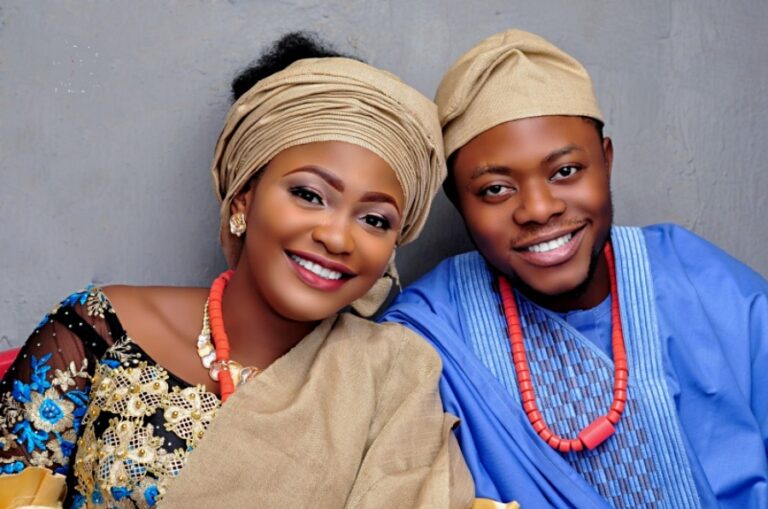
Seven steps of Igbo wedding are the required traditional process steps that couples complete to be considered married in Igbo land before their religious/church wedding can take place.
Even if engaged couples get married civilly at a courthouse; they are still required to complete these steps in Igbo culture. Some of these steps will differ from one Igbo village community to another, but they are still similar in nature. Also, the parents and elder members of the two families play the major roles during this process.
Step 1 – The First Introduction/Knocking On The Door
(Ikụ Aka n’ Uzo)
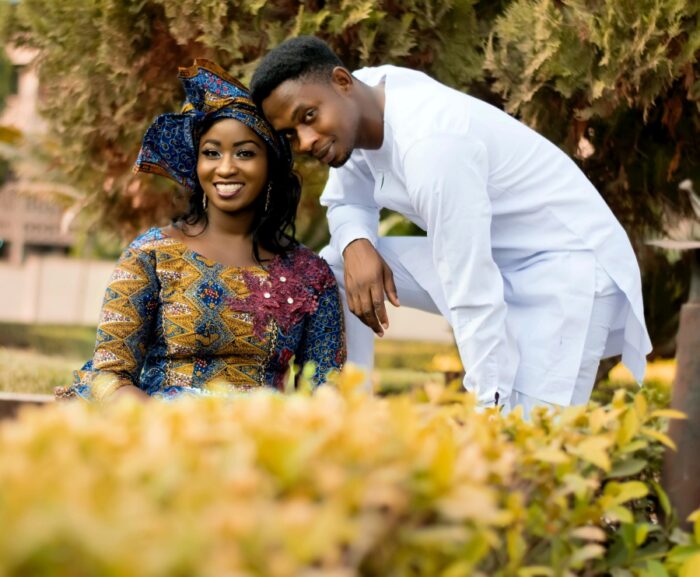 Following the engagement announcement to both families, the groom visits the bride’s family and informs them of his intention to marry their daughter and his wish to bring his family to see them. On the agreed date, both families meet for the first time at the bride’s home.
Following the engagement announcement to both families, the groom visits the bride’s family and informs them of his intention to marry their daughter and his wish to bring his family to see them. On the agreed date, both families meet for the first time at the bride’s home.
The groom’s parents, elders, and few family members will accompany the groom along with some alcoholic drinks to the bride home. While the bride’s parents along with a few family members prepare and wait for their potential new in-laws to arrive.
When the guests arrive, the bride’s family welcomes and present them with Kola-nut (the officially Igbo welcome gesture). The groom’s father will make his son’s intention known for their visit, and the bride’s father will acknowledge and says he will get back to them upon speaking with his daughter.
It’s customary that the groom family will not expect an answer for their visit during the first family meetup. However, both families will enjoy some drinks and food before parting ways.
Once the guests leave, the parents of the bride will discuss with their daughter about their visitor’s intention; if or not to proceed with the marriage request, and her answer is usually yes.
Step 2 – The Family Background Investigation
(Ijụ Ajụjụ)
The primary purpose of the investigation step allows both families to learn more about each other through outside inquiries of people who know the families within the villages and towns where each lives. Even if the bride and groom met and are getting married abroad, the investigation will still take place back home.
The two families conduct their investigation separately without the bride knowing and often the groom starts his investigation before proposing engagement, and before the first family introduction visit.
The bride’s family usually starts their investigation after the first introduction visit with the groom and his family, and after the family conversation with the bride. Still, the bride might never know when the investigation takes place.
The investigation helps the families to uncover where each family comes from, the village locations, each family character, family standing in society, the family dynamics, religious practices, including family general health information, and even blood type.
The outcome of the family background investigation can affect and determine the next step in the marriage process. Also, it’s customary either family can stop or delay the marriage process at this stage because of their investigation findings—it happens.
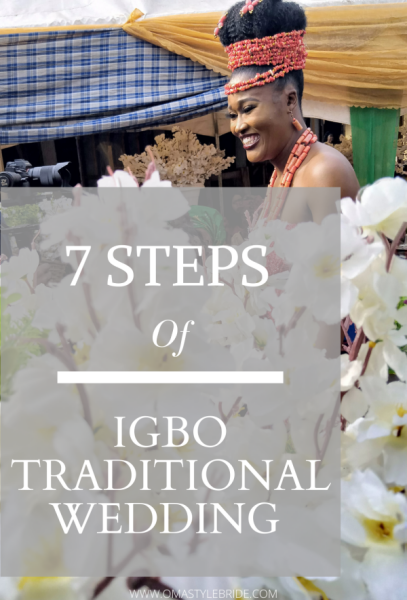
Step 3 – The Follow-Up Visit For The Discussion Of The Bridal List (Ihu Isi Nwanyi)
After the families complete their investigations and are happy with their findings, they will be happy to proceed with the marriage process, and then the families will schedule a follow-up visit. The follow-up visit is for the discussion of the Bridal List required for the marriage process. The List contains items the groom will bring to the bride’s parents on the Traditional Marriage—Wine Carrying Ceremony day.
Before the discussion of the Bridal List, the bride’s father will call her to come and greet the guests; and in the presence of the guests, her father will inform her of their guest marriage proposal–should they accept or decline? Shyly, she will nob yes to accept! LOL Marriage is on and the guests applauds!
Tradition demands the bride’s family give the Bridal List requirement to the groom’s family. The Bridal List includes items for the bride’s parents and community; the men (Umunna), the women (Umuada) and the young adults (Umu youth). The Bridal List includes various items as:
- Tubers of yam (amount varies with each community)
- Large bags of rice
- Specified number of alcoholic drinks and Soft drinks
- Cash gifts
- Kola nuts
- Goats/Cows
- Fruits
- Tobacco Head
- Large Stock fishes
- Bags of onions
- A bag of salt
- Bags of beans
- 2-3 George wrappers, High-end Ankaras, and head-ties
- Two pairs of shoes
- A wristwatch
- At least one bar of bathing soap
- One large basin
- Jewelry for the mother
- Luggage bags
- Handbags
- Large Talcum powder and so much more.
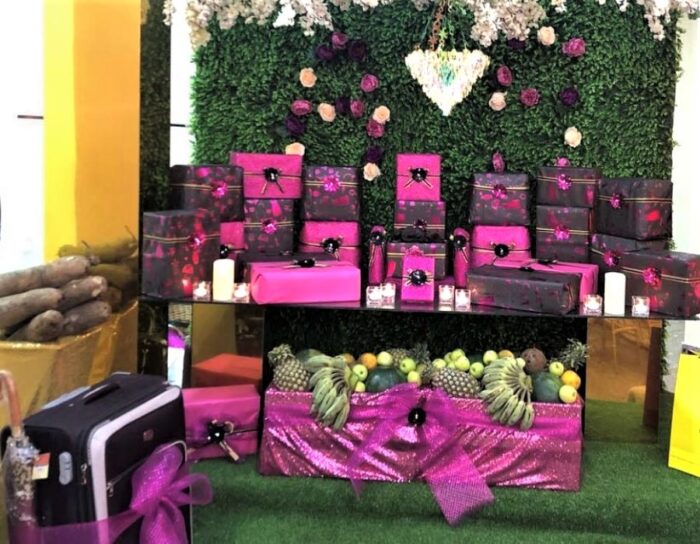
Note, the Bridal List will differ from one Igbo village community to another. The above list is mainly the type of items you should expect to see on the list. But the exact number of specified items required will depend on the traditions of each community.
Step 4 – The Bride Price Negotiations (Ego Isi Nwanyi)
Back in the day, the dowry by tradition is any specified amount of money the bride’s parents give the groom to pay for asking their daughter’s hand in marriage before the traditional wedding ceremony. Both families can/might negotiate the amount specified, while some might not.
The two families will meet and discuss the dowry amount as tradition demands. There is no set amount for the dowry as it’s up to the two families to decide when the dowry discussion comes up.
Thanks to modernization, this aspect of the Igbo marriage process has faded out in some village communities and slowly fading out in others. Today’s parents understand their daughter is not for sale and thus, the discussion of the dowry is more of a gesture. Or the bride’s parent may request a small amount to fulfill traditional requirements.
Any amount given, the bride’s parents adds it to their preparation expenses for the traditional wedding ceremony set to take place in their home.
Step 5 – The Traditional Wedding Ceremony (Igba Nkwụ)
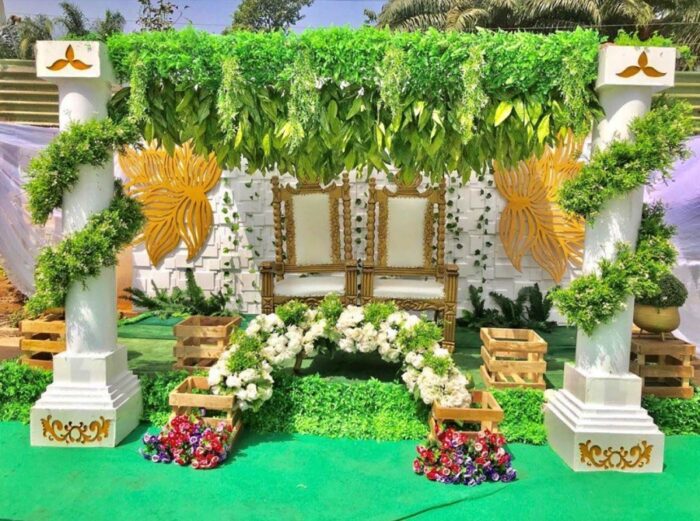
The Traditional wedding ceremony is an open event and the only part of the Igbo marriage process the public can attend at the bride’s family home along with both families, friends, and well-wishers in attendance to witness the union of the couple.
In Igbo culture, the traditional wedding is called Igba Nkwu (The Wine Carrying Ceremony) and it’s an important part of the wedding process when the bride carries the wine from her father to look for her groom.
Also, in some Igbo communities, the traditional wedding ceremony is more important than the civil wedding or religious wedding, which is more western in style. For some couples, once they complete their traditional marriage ceremony, they may decide to have a civil wedding or church/religious wedding for legal reasons with the government or not.
Some couples may opt for big traditional marriage and church/religious wedding, or a big traditional marriage and small scale civil wedding or church/religious wedding; or vice versa. The choice is for the couple to make.
The preparation for the traditional wedding day is the responsibility of the bride’s family. Both families will invite extended family members, friends, their communities, and well-wishers to come and witness the marriage of their children.
The preparation includes a lot of Igbo foods and drinks for the guests, music, dancing, and other entertainment for the celebration.
Asoebi – The Bridal Train
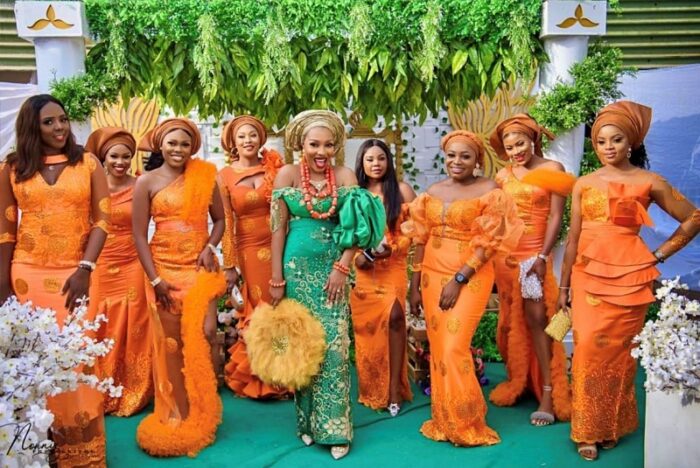
The bride, with help from her family, will select some of her unmarried girlfriends and female family members to serve as her Asoebi (the bridal train). These women will dress in matching Asoebi outfits to accompany the bride in processions during the ceremony.
While the preparation is going on, the bride will hide inside the house, getting ready for her big day until she is called to come and greet the guests.
The Groom & Family Arrival

The celebration kicks off once the groom with his family and friends arrives at the bride’s family home. The bride’s parents and other elder family members will meet up with the groom and his family and warmly greet them and have them seated while the music plays in the background as more guests and well-wishers arrive.
The celebration opens with a prayer; the bride’s family presents the groom’s family with kola nuts and drinks. After some speeches by both families, the bride will come out and greet the guests.
The bride comes out with music and dancing accompanied by her Asoebi ladies to greet all their guests and leaves. The celebration program continues and they serve the guests with foods and drinks, while other entertainment takes place too. Shortly after, the bride will come out again to find and present her husband to her parents.
The Wine Carrying
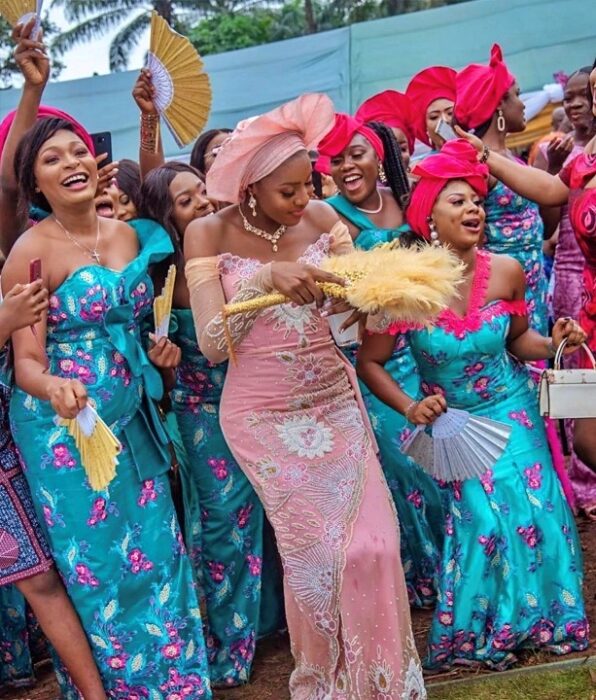
While the groom is hiding, the bride, changed to a new outfit, will dance out accompanied by her Asoebi ladies towards her parents and kneel before her father. Her father will restate to his daughter the intentions of the groom and his family and then gives her wine (i.e. palm wine) in a cup to drink a little and then to find the man she intends to marry and give the rest of the drink to him.
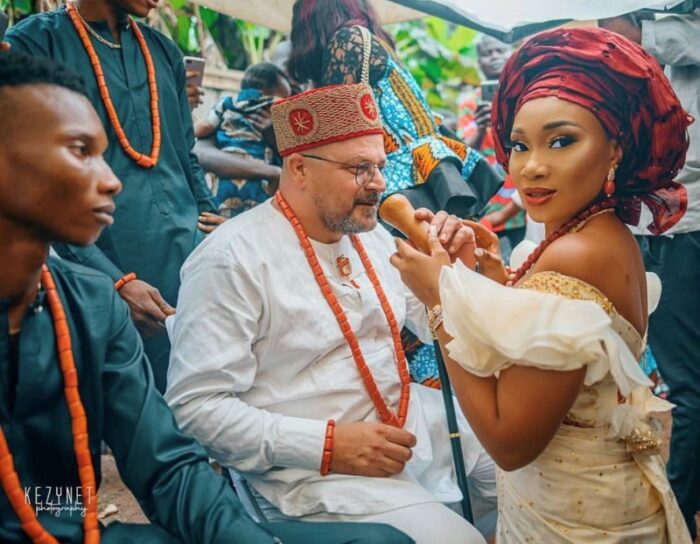
With the cup of wine in hand, the bride dances through the guests looking for her groom, who is hiding amongst the guests as tradition demands for the bride to find him. When she finds him, she goes to him, kneels, and offers him the remaining drink to him. The groom accepts the drink, drinks it all; and puts any amount of money in the cup for his bride.
The Couple Receives Blessings From Their Parents
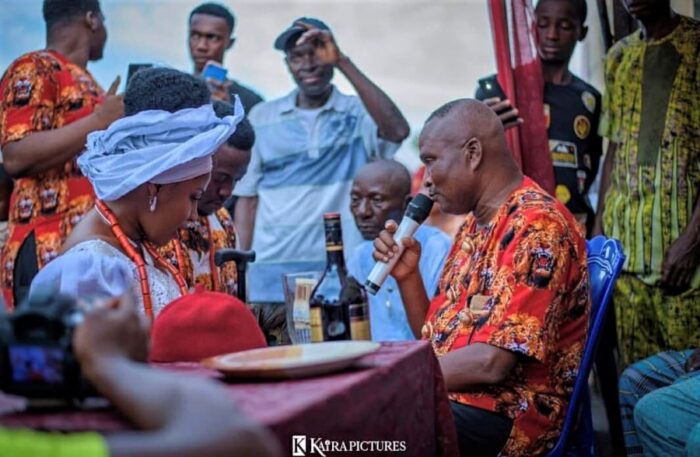
Cheered on by the crowd, the bride takes her groom to her father for blessings. Upon getting to her father, the couple kneels for his blessings. The father blesses the newlywed and offers them words of advice.
After the blessings, the couple rise to music and dancing; joined by their family and friends, showering them with spraying money.
The end of the traditional marriage day is very emotional for the bride and her family because the bride will leave her parents’ house that night with her packed luggage to go home with her new husband and his family.
Step 6 – New Home Sendoff Gifts By The Bride’s Parents (Idu Ụlọ)
New Home Sendoff Gifts by the bride’s parents is a tradition practiced in Igbo culture, where the bride’s family showers their newlywed daughter with house gifts to start her new married life.
The gifts vary depending on what the bride’s family can afford to gift their daughter such as a fridge, cooking utensils, beddings, air condition, cooking pots, cash gifts, car, new home and much more.
It’s up to the bride’s parents to present their daughter with the New Home Sendoff Gifts the night of the traditional marriage, do so days later or wait until after the religious wedding to present their daughter with the New home sendoff gifts to start her new married life.
Step 7 – Bride’s Family First Visit To The Newlyweds’ Home (Imata Ụlọ Di)
Few weeks after marriage and the newlyweds are back from their honeymoon (today’s modern practice); the bride’s family will visit their daughter’s new marital home for the first time. This is an Igbo practice for the bride’s family knows where their daughter is living in case of an emergency; and to confirm that she is happy and cared for in her new home.
On the scheduled visit day, the newlyweds/in-laws will prepare food and drinks and wait for the bride’s family to arrive. The visit is very casual and relaxed, and the two families will have general conversations with one another, or reminiscence about the newlyweds’ wedding day. The bride’s family might bring a small gift for their daughter, but not required. Both families will enjoy the prepared foods and drinks before the bride’s family leaves.
Thus, the beauty of every culture is the traditions they practice, and that includes the Igbo culture. Yes, marriage in Igbo culture is a long and expensive process, but that is the tradition and it’s for a reason to ensure the marriage lasts a lifetime. Therefore, it’s worth every stress and penny that goes into the marriage process of setting up a beautiful and happily married life for the newlyweds!
I wish you all the best with your planning & marriage!
Vendors:
55Media – Dr. Uchechi Azuike and Amobi Umeh – Traditional Wedding – J-Gates Visuals International – Kaira Pictures – Kezynet Photography – Nonniz Photography – Samson Ejim Photography – Somxy Styles Events – Wrap It Wrapping & Packaging Company by Ile Oko Ya – Youtube


YOU MAY ALSO LIKE
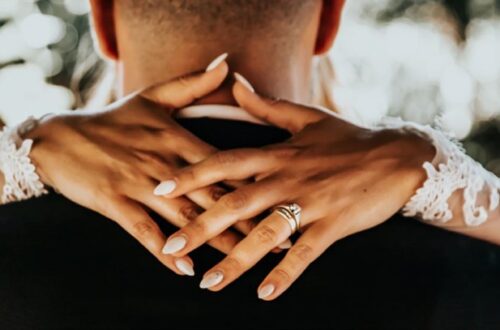
40 Fabulous Bridal Nail Design Ideas
March 1, 2021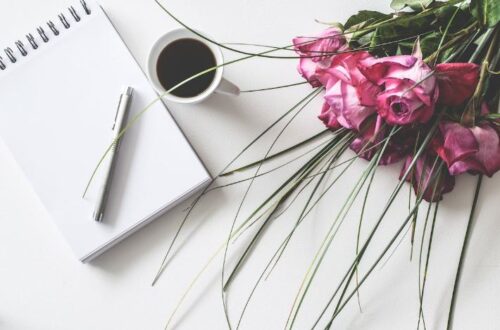
Your Dream Wedding Planning Budget Checklist
February 10, 2024


